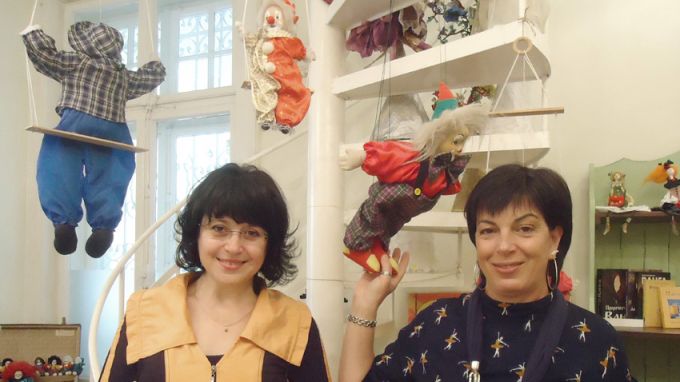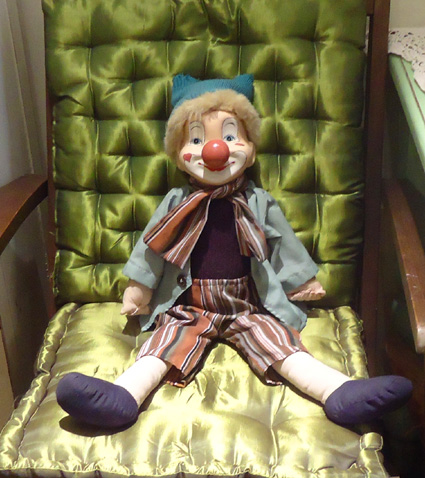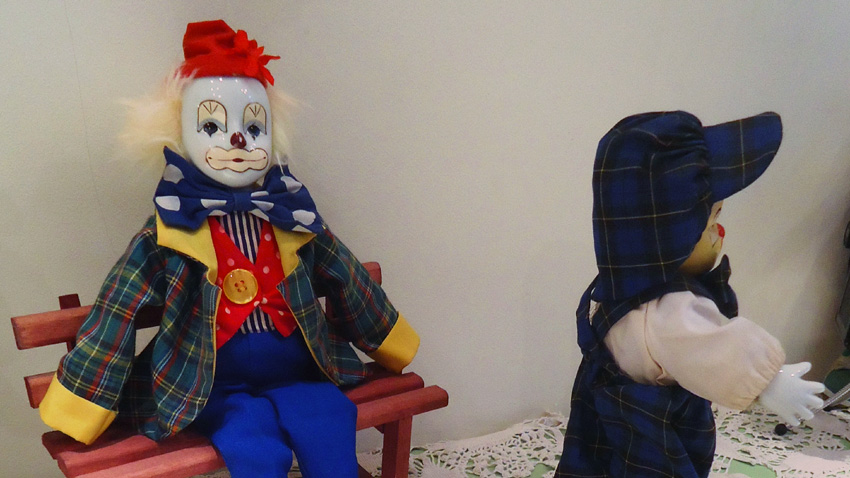
He just smiled, one rainy day in the centre of Prague. And love began with a smile - the smile of a clown.
Big or small, with clothes colourful or shabby, their eyes sparkling. At the Doll House, where they come to life when darkness falls, you can see the clowns - the smiling children of Ralitsa Filipova, whose passion it is to collect dolls with painted faces. But don't be too long about it - the exhibition “The smile of the clown” that opened on world circus day, is only on at the Art Doll House in Sofia until 28 April.
As a child she lived not far from the circus and was held spellbound by a world in which the impossible could become a miracle and colours blazed, showing up how drab the world was in those days. But it was the clown she found fascinating. Now she says she can sense what it stands for intuitively - the ability to confront any adversity, to face trials and tribulations with a smile and move on. As the clown does, even when he receives blow after blow in the arena of life, says Ralitsa Filipova and adds:
 “He may be sad, he may be alone because no one understands him - how can he smile when he has just been thrown out, kicked, insulted? He really is alone but inside, he is smiling. My dolls also have smiles on their faces - with the exception of the two directors. That is why I mounted the exhibition, because we smile less and less often. A smile is contagious and if I infect other people, they too will pass it on and tomorrow will be a day filled with more smiles.”
“He may be sad, he may be alone because no one understands him - how can he smile when he has just been thrown out, kicked, insulted? He really is alone but inside, he is smiling. My dolls also have smiles on their faces - with the exception of the two directors. That is why I mounted the exhibition, because we smile less and less often. A smile is contagious and if I infect other people, they too will pass it on and tomorrow will be a day filled with more smiles.”
She met her first clown in Prague - he beckoned to her with his bright colours and smiling face. For 25 years he has been following her from house to house and is never jealous of her rapidly growing household. Actually Ralitsa Filipova's passion for collecting clowns flared up four years ago when her husband - TV cameraman Oleg Ivanov gave her a clown with a blue nose. Since then it has been a mutual attraction. Some clowns she finds in battered suitcases at the flea market, others she picks out of heaps of toys with an unerring instinct.
“Each one comes with his own story,” Ralitsa Filipova says. “For example, one of my latest - an old, green and orange clown. One day, about a month ago, I was feeling down when I entered the children's department at Bulgarian National TV and there, on a chair was the clown with a torn leg. My co-workers had sat him down opposite my desk. I was so happy, my day suddenly turned brighter. Right away I took him to my friends, the doll-makers from the National Academy for Theatre and Film Arts - he needed quite a lot of repair work. And here he is now.”

The doll with one green and one orange leg and shoes with upturned noses looks down on us all - after all, he is a hanging clown. The flying clown has his back turned to visitors, he just doesn't care. The clown in love has a radiant smile on his face - he loves people, he loves life, he loves everything. But it is the gentleman in blue trousers that is most intractable - he hangs from a spiral staircase, swinging from side to side, never standing still. Below him, on one of the rungs are the orchestra conductors with their serious faces and wild hair, while the babies sleep softly in the suitcase.
Whatever she may be doing, Ralitsa Filipova's life revolves around children - she is the author of fairytales, plays, radio and TV shows and… 210 clowns. In her show “One million and two smiles” on Bulgarian National TV, she invented her “clown exercises” and says she really is sorry Stephen King invented his clown It that has terrified so many children. But clowns also go to see sick children. To be a clown is a vocation, a way of thinking, says Ralitsa Filipova and gives as an example Koko - actor Nikolay Nikolaev. For some years he has been offering children at Pirogov emergency hospital his “laughter therapy” and bringing tears to the eyes of adults with his new book “I, clown”. But here is the sad news - Koko will be saying goodbye to the sick children soon because of heartless words like “expiring” and “contract”.
English version: Milena Daynova
Europe Day or Victory Day? May 8th or May 9th? It is not that we do not constantly encounter socially divisive topics, and the current date – May 9th celebrating the victory over Nazi Germany in 1945 in World War II also causes debates in Bulgaria year..
The FameLab International Science Communication Competition aims to discover, train and give a platform to the world’s most promising new scientists. The competition was created in 2005 by the Cheltenham Science Festival, the largest and most..
"United We Stand" - Bulgaria's national motto - will be put into action on May 8 by the Bulgarian community in New York City, amid the realities of the times and the distance from home. At 7 pm local time, the Bulgarian Consulate General and the NYC..
"Alphabet of Beer" is the first title I came up with 15 years ago, when I started collecting my beer stories," journalist of the..
"United We Stand" - Bulgaria's national motto - will be put into action on May 8 by the Bulgarian community in New York City, amid the realities of the..
"We may be 10 hours behind Bulgaria, but our compatriots on the West Coast of the United States deeply cherish everything that connects them to Bulgaria..

+359 2 9336 661
